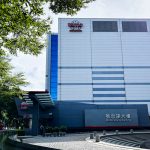For the past couple of years, Mesa, AZ, has proudly been able to proclaim its stature as an Apple manufacturing site.
But amid the hoopla of the Super Bowl in Phoenix, Apple’s plans to produce sapphire screens for iPhones at its Mesa plant fell apart. The company announced Feb. 2 that it would spend $2 billion to convert the factory into a data center.
The move followed an October bankruptcy filing by GT Advanced Technologies, the contractor Apple hired to produce the screens. According to Bloomberg, it failed to produce screens of sufficient quality, putting it out of compliance with its Apple agreement.
Despite the investment, the move will mean far fewer jobs for Mesa. KJZZ public radio reporter Kristena Hansen, a Cronkite School alum, said the data center will employ only 150 people, not the 700 employed at the factory, and far less than the thousands of jobs Arizona envisioned when it began competing for the factory.
Nonetheless, Apple considers the project to be a major one. And, it is still getting incentives from the state, although it and Arizona are in an economic development tango.
According to Hansen’s report, state lawmakers are considering a new package that would allow Apple’s “international operations center,” as the proposal calls it, to take advantage of the same tax breaks that were approved last year for manufacturers and designated specifically for Apple’s then-manufacturing facility.
The current proposal would mean at least $28 million in income and sales tax breaks for Apple, according to the proposed legislation and estimates by the Joint Legislative Budget Committee. (Apple decided not to accept $10 million from a different state fund that had been promised as part of the initial factory deal.)
That’s on top of the roughly $1 million per year Apple has already saved in property taxes this year and last because the Mesa facility is located within a Foreign Trade Subzone, according to calculations by KJZZ based on formulas and property information from the Maricopa County Assessor’s and Treasurer’s offices.
Businesses located within Foreign Trade Subzones and Zones, which are federally designated geographic areas, are exempt from various customs duties and taxes.
FTZ businesses enjoy an additional perk in Arizona that’s not offered in other states: lower property taxes. Apple and other Arizona FTZ businesses pay a 5 percent property tax rate versus the normal commercial rate of around 18.5 percent.
As a global command center, however, Apple’s facility would technically lose its FTZ status because it would no longer be involved in manufacturing and distribution activities as is required, Bill Jabjiniak, Mesa’s economic development director, told KJZZ.
But Apple is trying to prevent that from happening. Jabjiniak said the tech giant is currently working with U.S. Customs and Border Protection, which supervises FTZs, to see how it can maintain its FTZ status, since it will be importing and exporting parts.
In the meantime, Mesa can still claim to be an Apple location. The computer company just won’t be producing something you can hold in your hand.










